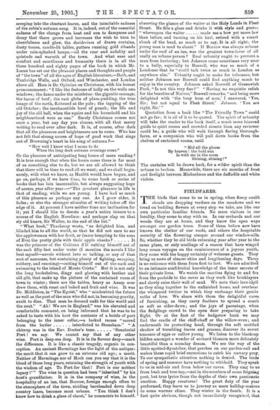chuck of the head, as much as to say, It
is all right; the young man is used to claret." If Borrow was always urbane under the roof of an inn, was the greatest town-lover of all really an urbane person P Real urbanity ought to prevent a man from hectoring; but Johnson came sometimes very near to a bully, especially to Boswell, who was so much of a Londoner that he "could talk twice as much in London as anywhere else." Urbanity ought to make for tolerance, but neither Johnson nor Boswell could find anything much to enjoy in the country. Johnson asked Boswell of Greenwich Park, "Is not this very fine P" "Having no exquisite relish for the beauties of Nature," Boswell remarks, "and being more delighted with the busy hum of men,' I answered, Yes,
Sir; but not equal to Fleet Street.' Johnson. You are right, Sir.'"
Quotation from a book like "The Friendly Town" could not go far; it is all of it to be quoted. The spirit of urbanity will take the reader to the book itself, a much more leisured guide to quiet rooms and crowded streets than any reviewer could be; a guide who will walk through flaring thorough- fares, or a companion who will pull down books from the shelves of curtained rooms, until.
"Mid all the gloom By heaven the bold sun Is with me in the room
Shining, shining!"




















































 Previous page
Previous page